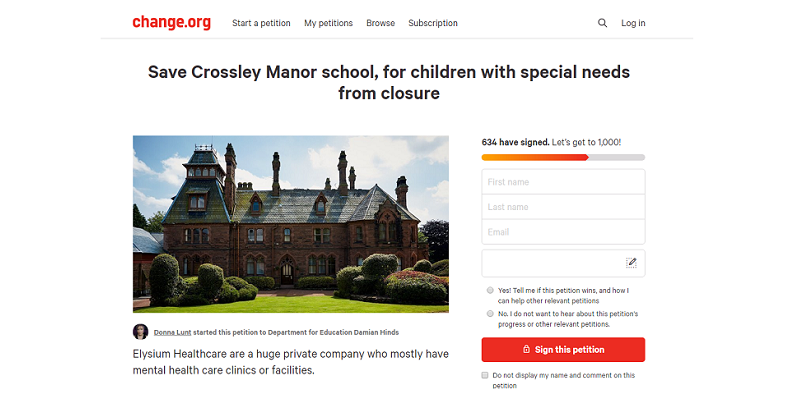Hundreds of parents want private companies banned from running special schools after a healthcare firm announced plans to close a school just weeks before the end of term.
Parents of pupils at Crossley Manor school in Rainhill, Merseyside were told by Elysium Healthcare on June 17 that the independent school would close this month. The short notice leaves many pupils without places for September.
Almost 600 people have signed a petition calling on the Department for Education to ban the involvement of private firms in running schools for pupils with complex needs.
Many councils rely on private special schools, which have dwindled in recent years despite a growing pupil population. DfE figures show there were 58 non-maintained special schools as of January 2019, down from 75 in 2010.
Crossley Manor has 12 pupils with social, emotional and mental health needs. According to government records it has a capacity of 68, but it hasn’t come close to reaching that target since it opened in September 2017.
Elysium, which runs three other schools and operates Crossley Manor, a residential care home, on the same site, blames poor recruitment for the closure. Parents say the company failed to adequately advertise the provision.
“Unfortunately, we were unable to attract sufficient pupils,” a spokesperson said.

“We are now focused on supporting local authorities, families and students to find the best alternative placement before the new term commences in September.”
Donna Lunt, a parent of an 11-year-old child with autism and epilepsy, said the school had left it too late for many families to find alternative school places.
“There’s nothing for any of the kids. We’re all just scrabbling around.
“The school I got offered the other day is in Bootle, and that’s miles away. I wouldn’t like him to be that far away because of his medical needs.
“I’m willing to keep him at home for as long as it takes because I don’t want to put him somewhere for it to fail again. This [school was] working for all these kids. It’s such a shame.”
St Helens Council said it was “working with the school – as well as the families of those affected – to find suitable alternative educational settings to meet the needs of pupils”.
Elysium, which specialises in healthcare for people with mental ill health, learning disabilities and neurological conditions, made a pre-tax profit of £9.4 million in 2017.








Whilst totally understanding the horrific situation these families have been put in, you can’t talk about banning private firms from running special schools unless you can come up with an alternative. As I understand it, currently there simply aren’t enough places in maintained special schools which is why, for the most part, authorities place children in independent special schools.
The reason there aren’t enough places is open to debate. I’ve heard opinions that it was the local authorities themselves who reduced capacity, rather like they did with PRUs, but also that they are willing to pay much higher fees to send a child to independent special school than they would pay for the same child to go to a maintained special school. On that basis maintained special schools can’t compete on resources, and so unsurprisingly parents are very keen to send their child to the independent special school. And so the cycle continues.
This blast from the bast might interest you. https://www.telegraph.co.uk/news/uknews/1459507/Closure-of-special-schools-harms-all-pupils.html
It comes all the way from 2004, and explains that capacity in special schools was being reduced from 1997 when the education secretary was David Blunkett, who felt strongly about integration following his own childhood experiences.
Unfortunately, like the Warnock report before this, no one seems to have talked to parents and teachers about how much integration is possible and what the impact of it is on the child with the SEND and their peers. In later life, Baroness Warnock admitted that her reforms had been ‘disastrous’ for children and young people with high functioning autism. From personal experience, I can confirm she was right about this, and that we need LA controlled, good quality provision in each area for those who, through no fault of their own, cannot learn in a mainstream environment.
Sadly, I don’t believe it’ll happen because it’d take time and cost money and governments are all about short term fixes and splashy public announcements that leave teachers and parents asking ‘ how the hell is THAT going to work?’
Hmmm, thanks for the link. But rather depressing really.
Yes, it is depressing. It’s also desperately unfair on the children with SEND, the others in their class, the teachers who have to try to educate such a wide range of children without training and resources and the families who are left to pick up the pieces when mainstream education can’t work and there is no alternative except a residential placement or home education. I’m not calling it elective home education because it isn’t for far too many people.